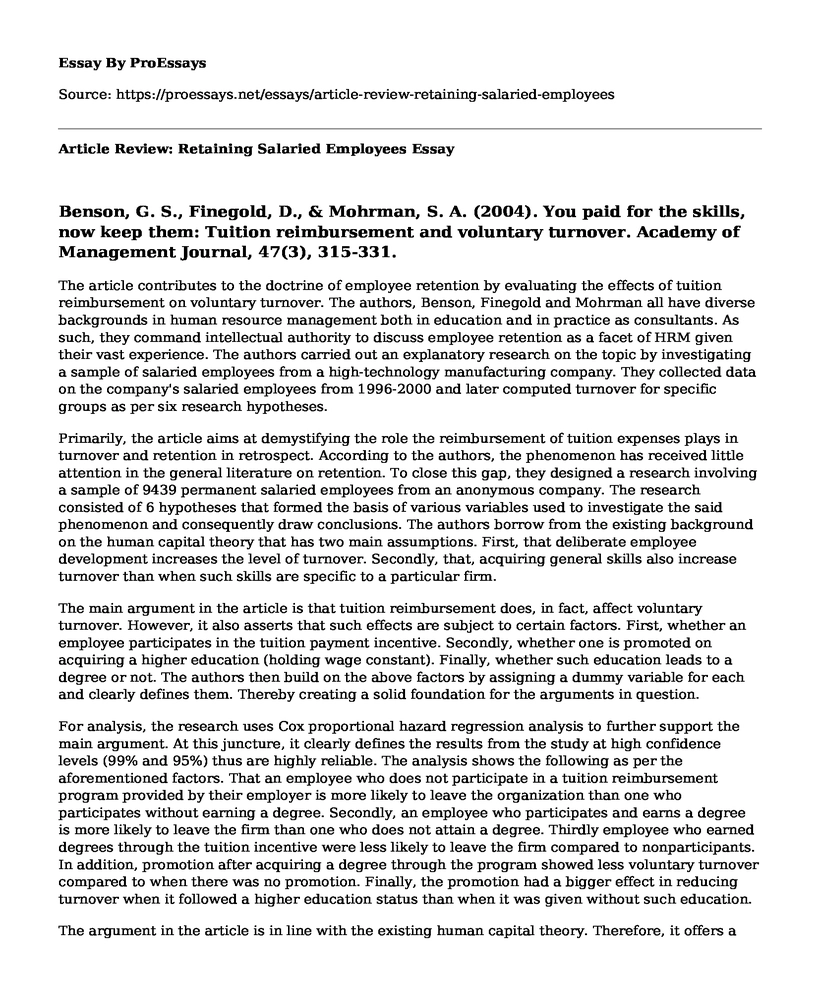Benson, G. S., Finegold, D., & Mohrman, S. A. (2004). You paid for the skills, now keep them: Tuition reimbursement and voluntary turnover. Academy of Management Journal, 47(3), 315-331.
The article contributes to the doctrine of employee retention by evaluating the effects of tuition reimbursement on voluntary turnover. The authors, Benson, Finegold and Mohrman all have diverse backgrounds in human resource management both in education and in practice as consultants. As such, they command intellectual authority to discuss employee retention as a facet of HRM given their vast experience. The authors carried out an explanatory research on the topic by investigating a sample of salaried employees from a high-technology manufacturing company. They collected data on the company's salaried employees from 1996-2000 and later computed turnover for specific groups as per six research hypotheses.
Primarily, the article aims at demystifying the role the reimbursement of tuition expenses plays in turnover and retention in retrospect. According to the authors, the phenomenon has received little attention in the general literature on retention. To close this gap, they designed a research involving a sample of 9439 permanent salaried employees from an anonymous company. The research consisted of 6 hypotheses that formed the basis of various variables used to investigate the said phenomenon and consequently draw conclusions. The authors borrow from the existing background on the human capital theory that has two main assumptions. First, that deliberate employee development increases the level of turnover. Secondly, that, acquiring general skills also increase turnover than when such skills are specific to a particular firm.
The main argument in the article is that tuition reimbursement does, in fact, affect voluntary turnover. However, it also asserts that such effects are subject to certain factors. First, whether an employee participates in the tuition payment incentive. Secondly, whether one is promoted on acquiring a higher education (holding wage constant). Finally, whether such education leads to a degree or not. The authors then build on the above factors by assigning a dummy variable for each and clearly defines them. Thereby creating a solid foundation for the arguments in question.
For analysis, the research uses Cox proportional hazard regression analysis to further support the main argument. At this juncture, it clearly defines the results from the study at high confidence levels (99% and 95%) thus are highly reliable. The analysis shows the following as per the aforementioned factors. That an employee who does not participate in a tuition reimbursement program provided by their employer is more likely to leave the organization than one who participates without earning a degree. Secondly, an employee who participates and earns a degree is more likely to leave the firm than one who does not attain a degree. Thirdly employee who earned degrees through the tuition incentive were less likely to leave the firm compared to nonparticipants. In addition, promotion after acquiring a degree through the program showed less voluntary turnover compared to when there was no promotion. Finally, the promotion had a bigger effect in reducing turnover when it followed a higher education status than when it was given without such education.
The argument in the article is in line with the existing human capital theory. Therefore, it offers a logical insight into the relevance of tuition reimbursement on the consequent retention of employees. To start with, the article confirms the theory that employee turnover increases with attaining higher education through reimbursement perks. This reasoning makes sense since employees have more alternatives at their disposal with their improved skill set. While an employee who does not participate in such programs does not per se acquire new skills thus has fewer options. In addition, an employee who does not get promoted on acquiring a degree is more likely to leave a firm. This aspect manifests since the new skill set is out of sync with the employee's current job requires.
The authors give a diverse background on their assertions on the relationship between higher education sponsored by a firm and consequent levels of retention. The study also goes on to give empirical evidence of the same further supporting the assertions. However, there is a limitation since the evidence is drawn from only one company. As such it presents potential problems in extending the study to other areas or organizations.
While the argument in the article is convincing, it is unclear why attaining a bachelor's degree is considered less influential on turnover. The general doctrine in human capital suggests that attaining new general skills increases turnover among employees in a particular firm. As opposed to when such skills are more specific towards that firm. This omission raises the question of whether the skills offered in an undergraduate degree are specific to a particular firm or they are just inconsequential. Nevertheless, the authors admit that this aspect demands further research. All in all, the authors present their ideas clearly such that one can easily follow the discussion. As such, the article's insights on retaining salaried employees where a firm offers tuition reimbursement are intelligible.
Reference
Benson, G. S., Finegold, D., & Mohrman, S. A. (2004). You paid for the skills, now keep them: Tuition reimbursement and voluntary turnover. Academy of Management Journal, 47(3), 315-331.
Cite this page
Article Review: Retaining Salaried Employees. (2022, Jul 08). Retrieved from https://proessays.net/essays/article-review-retaining-salaried-employees
If you are the original author of this essay and no longer wish to have it published on the ProEssays website, please click below to request its removal:
- Influence of Technology in Work-Life Balance Essay
- Does an Increase in Wage Motivate Workers to Work Harder?
- Paper Example on Theories of Motivation as Applied to Second Language Learning
- Global Trends in Human Resource Management Essay
- Developing an Employee Suggestion Program in Health Care Paper Example
- Paper Example on Volunteering: Benefits for Non-Profits and Society
- Essay Example on End-of-Life Simulation: A Vital Nursing Career Experience







